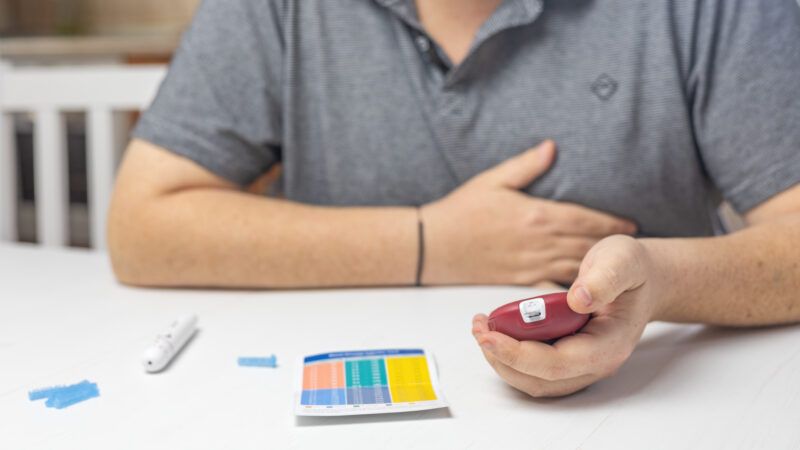Boom in DIY Medical Testing Gives Americans More Control Over Their Health
Thanks to clever inventions and investments from venture capitalists, the average American can head to CVS and purchase kits to test for drug use, sexually transmitted diseases, AIDs, diabetes, blood pressure and cholesterol.

One of my favorite memes on X this week showed two photographs—one of war and devastation and the other of a neat tree-lined street with middle-class suburban houses. The caption under the first picture: "This is the reality of life on Earth." The caption on the second one: "This is an anomaly and can end at any time."
It's a great reminder of how good most of have it, especially within the context of millennia of human existence. It's also a reminder that many of our fears and fixations—especially those commonly expressed on social media and in legislatures—fall into what my daughter calls first-world problems. People get worked up about everything, as they express dire concerns about innovations that promise to make our lives even better.
That's perhaps a grandiose entry into a mundane topic: at-home, do-it-yourself medical tests. Thanks to clever inventions and investments from venture capitalists, the average American can head to CVS and purchase kits to test for drug use, sexually transmitted diseases, AIDs, diabetes, blood pressure and cholesterol. This should strike normal people as a blessing.
But this remarkable development has upset the professional worriers. The Washington Post recently spotlighted a "shadow system" of such tests. "Buoyed by regulatory vacuums, Silicon Valley is building a booming online wellness market that aims to leave the doctor's office behind," it explained. "The boom angers some doctors, who argue that circumventing their offices can lead to questionable remedies, misdiagnosis or delayed medical care."
This sounds so, well, ominous, but there's no reason DIY tests will cause anyone to avoid a doctor. I had recent health concerns and made a doctor's appointment. Given our overburdened system, the soonest appointment I could get was months away. I bought test strips at the pharmacy, which helped alleviate my worries. The tests spurred me to do some research.
Obviously, Google is no replacement for a doctor's visit. But by the time I saw my doctor and had the requisite lab tests, I was better informed and had developed a series of intelligent questions. The official tests confirmed the $15 test that I purchased. It was no cure-all, but DIY tests were a useful tool in the process.
Sure, some people might buy a test and then skip the doctor's visit. So what? We're all ultimately responsible for our own health. I know people who ignore their health, avoiding home tests and doctors entirely. Yet we don't need nannies limiting our access to useful products as a means to coerce those folks into doctor's visits. By the way, many people who raise fears about these innovations are simply trying to prop up the current cartels.
I once wrote about app-based eye exams that enable consumers to do a basic check of their vision and order new glasses. It should surprise no one that an organized group of optometrists lobbied state and federal governments to ban this form of telemedicine, even though some eye-care startups sent the exams to qualified ophthalmologists for review. One need not be a cynic to suspect the opposition stemmed more from a fear of losing business than concern that Americans were endangering their vision. That's the usual source of pushback whenever some groundbreaking invention threatens to shake up established business models.
The Post article fears "incremental scientific innovations can be quickly funded, brought to market and peddled to consumers online before their health benefit has been proved" and notes that "many see a dangerous Wild West of medical information." Peddled? The horror of it. Yet filling the "regulatory vacuums" with additional rules and government oversight will only slow the development of life-enhancing products and services.
The Post writers could find volumes of studies and news reports—including those on its own pages—documenting the repeated failures of the U.S. Food and Drug Administration, which oversees the approval of medical devices, drug safety, and the food supply. Most commonly, the FDA is maligned for its red-tape-laden process that delays the release of useful products. Nevertheless, the newspaper echoes FDA "alarms" as "the market for lab tests has exploded."
If we want medical care to improve, we need to loosen the stifling regulatory framework that includes unnecessary occupational-licensing requirements, restrictions on telemedicine, and limits on the scope of practice of professionals such as nurse practitioners. Efforts to broaden healthcare availability always runs head on into lobbies representing established professions and government agencies that are committed to protecting their turf.
At-home tests pose the newest threat to the established medical order. But they offer a potential boon for Americans who, as the co-founder of one cancer-testing startup told the Post, can now act as "the CEO of their own health." It's time to rebuke the naysayers, take some responsibility for our own lives, stop worrying about every piddling potential downside of innovative new ideas—and recognize the amazing times we're living in.
This column was first published in The Orange County Register.


Show Comments (6)